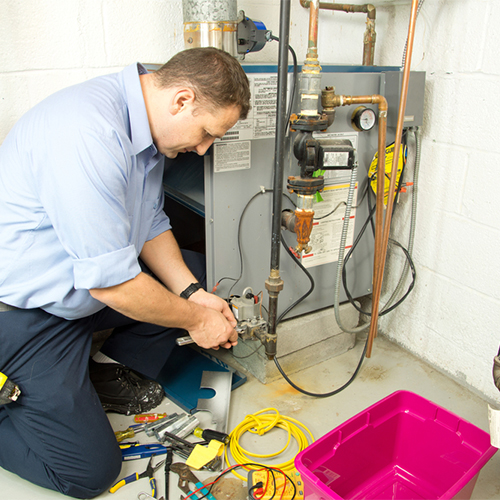Heat-pump-maintenance Kitchener – Waterloo – Cambridge
Heat Pump Maintenance: Ensuring Optimal Performance and Longevity
Heat pumps are a vital component of modern HVAC systems, offering efficient heating and cooling solutions for homes and businesses alike. To ensure your heat pump operates at peak performance and lasts for years, regular maintenance is essential. At Infiniti HVAC, we’re committed to helping you understand the importance of heat pump maintenance and how it can save you time, money, and energy.
Why Heat Pump Maintenance Matters
Heat pumps work year-round to keep your indoor environment comfortable. Over time, wear and tear, dirt accumulation, and system inefficiencies can impact their performance. Regular maintenance ensures:
- Enhanced Efficiency: A well-maintained heat pump runs more efficiently, reducing energy consumption and lowering utility bills.
- Extended Lifespan: Routine care prevents minor issues from escalating into costly repairs, extending the life of your system.
- Improved Air Quality: Clean components mean better airflow and reduced allergens, promoting a healthier indoor environment.
- Reliable Performance: Preventative maintenance minimizes unexpected breakdowns, ensuring consistent comfort.
- Cost Savings: Addressing minor issues early prevents expensive repairs or replacements down the line.
Key Components of Heat Pump Maintenance
A comprehensive heat pump maintenance plan includes several critical tasks:
- Inspection of Electrical Connections Loose or damaged electrical connections can lead to system inefficiencies or even pose safety hazards. Regularly inspecting and tightening these connections ensures your system operates safely and efficiently.
- Filter Cleaning and Replacement Dirty or clogged filters reduce airflow, forcing the system to work harder and use more energy. Replacing or cleaning filters every 1-3 months is crucial for maintaining efficiency.
- Coil Cleaning Both indoor and outdoor coils can accumulate dirt and debris, reducing heat transfer efficiency. Cleaning these coils restores optimal performance and prevents strain on the system.
- Refrigerant Level Check Low refrigerant levels can compromise your heat pump’s ability to heat or cool effectively. A professional technician can check and refill refrigerant levels as needed.
- Inspection of Ductwork Leaky or damaged ductwork can result in significant energy loss. Sealing and repairing ducts during maintenance ensures maximum energy efficiency.
- Thermostat Calibration An improperly calibrated thermostat can lead to incorrect temperature readings, affecting comfort levels. Ensuring your thermostat functions accurately helps maintain a consistent indoor climate.
- Lubrication of Moving Parts Proper lubrication reduces friction and wear on moving parts, preventing premature breakdowns and ensuring smooth operation.
- Defrost Cycle Check In colder months, your heat pump’s defrost cycle prevents ice buildup on the outdoor unit. A thorough inspection ensures this function operates as intended.
DIY Heat Pump Maintenance Tips
While professional servicing is essential, homeowners can take some simple steps to keep their heat pumps running smoothly:
- Keep the Outdoor Unit Clean: Regularly remove leaves, debris, and dirt from around the outdoor unit to maintain airflow.
- Check and Replace Filters: Follow the manufacturer’s guidelines for filter maintenance.
- Monitor Thermostat Settings: Use programmable settings to optimize energy usage.
- Inspect for Unusual Sounds: Strange noises can indicate potential issues; address them promptly.
- Ensure Unobstructed Airflow: Keep vents and registers clear of furniture and obstructions.

Professional Maintenance Services
While DIY tasks are helpful, professional maintenance is crucial for addressing complex issues and ensuring optimal system performance. At Infiniti HVAC, our trained technicians provide comprehensive heat pump maintenance services, including:
- Thorough inspections of all components
- Cleaning and lubrication of moving parts
- Detailed diagnostics and performance testing
- Expert advice on system upgrades or replacements
If you notice any of these issues, don’t wait to seek professional assistance.
The Best Time for Maintenance
It’s recommended to schedule heat pump maintenance twice a year: once before the cooling season (spring) and once before the heating season (fall). This proactive approach ensures your system is ready to handle seasonal demands.Signs Your Heat Pump Needs Maintenance
Pay attention to these warning signs that indicate it’s time for a professional inspection:- Reduced heating or cooling performance
- Unusual noises or vibrations
- Increased energy bills
- Frequent cycling on and off
- Uneven temperature distribution
- Ice buildup on the outdoor unit
Benefits of Choosing Infiniti HVAC
At Infiniti HVAC, we prioritize your comfort and satisfaction. Our heat pump maintenance services are designed to:
- Enhance energy efficiency
- Prolong the lifespan of your system
- Prevent unexpected breakdowns
- Provide peace of mind
Our team uses advanced tools and techniques to deliver top-notch service, ensuring your heat pump operates at its best year-round.
Frequently Asked Questions (FAQ)
If you don’t replace your furnace filter regularly, it can become clogged with dust and debris, leading to reduced airflow, higher energy consumption, and potential system damage. This can result in expensive repairs and a shorter lifespan for your furnace.

